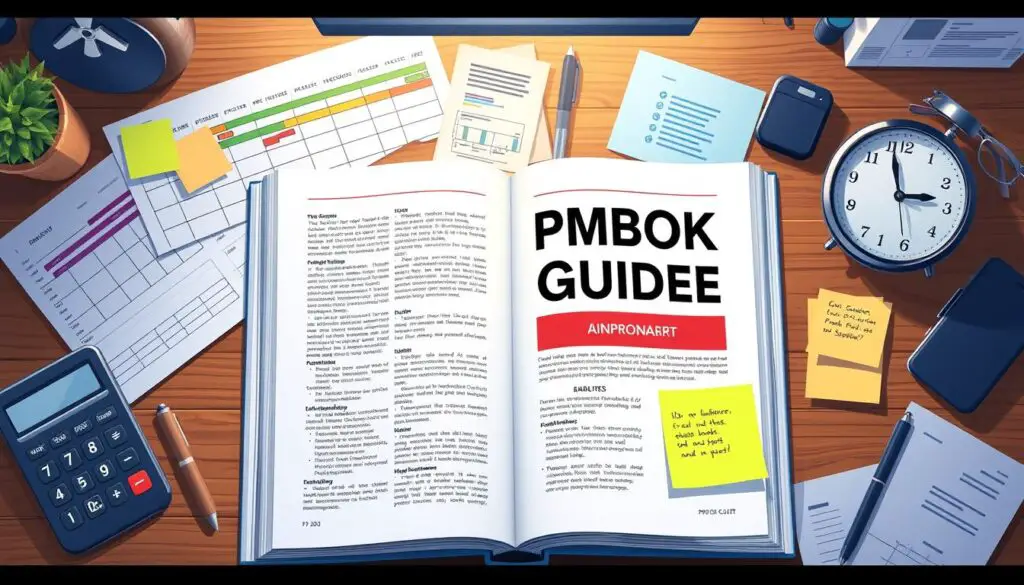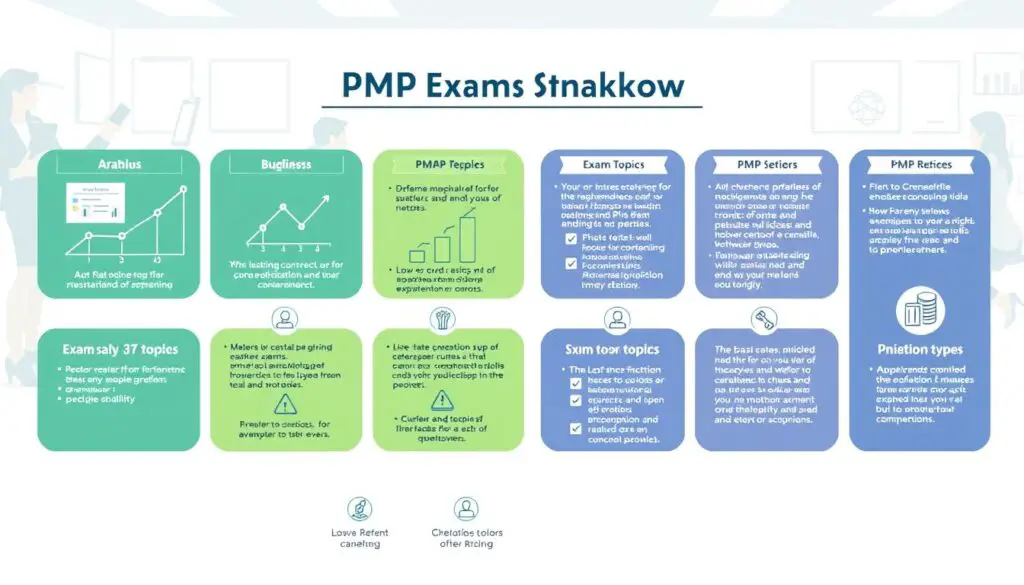Getting ready for the Project Management Professional (PMP) certification can boost your career in project management. This guide helps you understand how to prepare for the PMP exam. You’ll learn about the key resources you need.
There are over 762,000 PMP certification holders worldwide. You’ll join a respected group of professionals when you pass. Knowing the requirements, like 35 hours of project management education and experience, is important.
Plan to study for 2-3 months. Spend at least an hour a day studying, with longer sessions on weekends. Using good study materials, like the PMBOK® Guide, and practicing with exam simulations will help you prepare well.
Get ready to succeed with this detailed PMP study guide. It covers important strategies and best practices. You’ll also learn effective ways to prepare for the exam.
Understanding the PMP Certification
The PMP certification is a top honor in project management. It’s given by the Project Management Institute (PMI). It shows you’re an expert and boosts your career. Knowing about it helps you grow professionally.
What is the PMP Certification?
The PMP certification proves you’re good at managing projects and teams. To get it, you need to meet strict rules. This includes having at least 60 months of project management experience, depending on your education.
The exam tests your skills in three areas: People, Process, and Business Environment. This makes sure you’re well-rounded in project management.
Why Get PMP Certified?
Getting PMP certified can change your career for the better. It opens doors to better jobs and makes you more attractive to employers. It also connects you to a worldwide network of professionals.
The benefits go beyond just money. It makes you more credible and shows you can manage projects well. This leads to better success for your organization.
Who Should Pursue PMP Certification?
The PMP certification is for experienced project managers. It’s for those who want to make their project management skills official. People with at least three years of experience or those leading teams are perfect candidates.
Fields like IT, construction, and healthcare really value PMP certification. It shows you’re dedicated to doing great project management work.
Guide to PMP Exam Preparation
Creating a good study plan for the PMP exam is key to success. This guide will help you make a study schedule, find the right study materials, and pick the best PMP exam prep courses.
Creating Your Study Schedule
Having a solid PMP exam study plan is vital. Start by setting aside 2-3 months for focused study. Adjust your pace based on your schedule and how you learn best.
Plan to study in focused blocks, using weekends for in-depth study. Add PMP podcasts or videos to your daily commute for extra learning. This mix of structured and flexible study boosts retention and understanding.
Essential Study Materials for PMP Preparation
Your study toolkit should have a range of quality PMP exam materials. The PMBOK® Guide is a must, with over 750 pages of essential info. Also, consider top PMP books by Rita Mulcahy and Andy Crowe.
Don’t forget flashcards and online courses to reinforce key concepts. Using materials from different authors helps in thorough preparation.
Recommended PMP Exam Prep Courses
Choosing the right PMP exam prep courses is a big step. Look at platforms like Simplilearn and Andrew Ramdayal’s Udemy courses for detailed training.
Cost-effective options like Andrew’s mock exams and exam simulator are around $10 and $45. These offer great value for your investment. Pick a course that fits your learning goals to improve your understanding and skills.

Effective PMP Exam Preparation Strategies
Getting ready for the PMP exam needs a mix of strategies. Use the PMBOK Guide, practice well, and join structured study sessions. These steps can help you pass the exam. Here are some key strategies to add to your study plan.
Utilizing the PMBOK Guide
The PMBOK Guide is key to understanding the exam’s knowledge areas. Start by diving into this guide. Break it down into sections you can handle. Spend a bit of time each week on a specific area.
Review what you’ve learned regularly. This helps solidify your knowledge.

Practice Exams and Simulators
Practice exams and simulators are vital for exam prep. Use these tools to check your readiness. Start with a baseline exam to see your strengths and weaknesses.
Take practice exams often to track your progress. Tools like Pocket Prep offer over 1000 questions to help you prepare.
Tips for Successful Study Sessions
Good study sessions need structure and focus. Short, focused study periods are more effective than long ones. Use active learning methods like note-taking and flashcards.
Join study groups to stay motivated. Regular breaks help keep your focus sharp and improve memory.
Look into workshops or online courses for interactive learning. This boosts your motivation and gives you valuable insights. A well-planned study schedule helps avoid cramming and boosts your confidence.
| Study Method | Benefits | Examples |
|---|---|---|
| Utilizing PMBOK Guide | Foundation for knowledge | Daily reading and reviews |
| PMP Practice Exams | Real exam experience | Pocket Prep |
| Short Study Sessions | Improved retention | Six 30-minute blocks |
| Study Groups | Peer motivation | Discussion forums |
| Mock Tests Analysis | Identify areas of weakness | Regular performance review |
PMP Exam Tips and Best Practices
Getting ready for the PMP exam means knowing its structure well and planning carefully. Mastering the PMP exam format and using top resources can boost your success chances. Here are key points to focus on during your prep.
Understanding the Exam Format
The PMP exam has 200 multiple-choice questions. These include situational, formula-based, and knowledge-based questions. Knowing the exam structure is key for studying smartly.
Good time management is vital for the four-hour exam. It’s important to understand the types of questions you’ll face. The PMBOK® Guide outlines 47 processes and ten knowledge areas, so be sure to cover all bases.
Common Mistakes to Avoid
Knowing common mistakes in PMP exam prep can really help. Many overlook topics like Project Stakeholder Management, which is now part of the PMBOK. Relying too much on memorization can lead to weak spots.
Spotting these mistakes early can lay a strong foundation. Don’t let procrastination or poor study habits hold you back. Mix up your study methods, like watching videos, reading, and discussing with peers.
Best Resources for PMP Exam Prep
Use the best PMP prep resources to your advantage. Rita Mulcahy’s PMP Exam Prep offers practice questions to spot your weak areas. Try different platforms, like Andrew’s TIA simulator and David’s YouTube channel, to deepen your knowledge.
Join study groups and online forums, like PMP Reddit, for support and tips. Flashcards are great for quick review. Aim for a study plan that includes mock exams—six tests from different sources are suggested for thorough prep.

By grasping the exam format, avoiding common mistakes, and using the best resources, you can get ready for the PMP exam with confidence.
Conclusion
Getting PMP certified is a journey that needs a plan and hard work. Using good study strategies can really help you understand the material better. This guide has given you the basics to remember.
Remember, making a study plan is key. Aim for 35 hours or more of study. Use all the resources and support you can find.
When studying for the PMP, focus on three main areas: People, Process, and Business. Knowing how much of each to study will help you focus. Practice with mock exams to boost your confidence.
Scoring well in practice tests is a good sign of success. It shows you’re ready for the real exam.
Understanding the value of PMP certification is important. It’s a big step in your project management career. With hard work and a good plan, you can pass the exam and get certified.
Source Links
- Passing the PMP Exam: A Practical Guide from My Experience
- How to Study for the PMP Exam: Your Guide to Passing
- How to Ace the PMP Exam in 2024-25? A Comprehensive Guide
- Understanding PMP Exam Preparation
- How Long is the PMP Exam? All You Need to Know
- Passing the PMP Exam: What Should You Study?
- How I aced the PMP Exam with only 4 weeks of study
- PMP Exam: Quick Reference Guide, Sixth edition (Test Prep series) – VERY GOOD 9781732055704 | eBay
- Invensis Learning
- How to Pass the PMP Exam: 4 Tips for Effective Preparation
- Top 7 Tips for PMP Exam Preparation
- Mastering the PMP Exam: Essential Tips for Success
- Mastering the PMP Test: Key Strategies and Tips for Success
- How I Passed the Project Management Professional (PMP) Exam on My First Attempt with 3ATs in 11 Days of Self-Study: My Personal Experience




